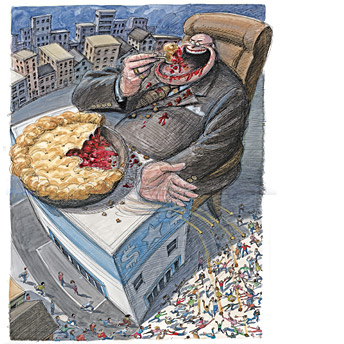Paul Krugman i Rolling Stone: Hvordan Bush tager fra de fattige og giver til de rige

Den amerikanske økonomi går på papiret godt, der er efter sigende gang i hjulene, og såvel bruttonationalproduktet som virksomhedernes fortjeneste stiger. Hvorfor opfatter de fleste amerikanere så økonomien som stagnerende?
Er det en del af venstrefløjens onde komplot, at ikke engang dét, som Bush angiveligt rent faktisk gør godt - dvs. økonomien kan han få æren for?
Nej, forklarer Paul Krugman i artiklen The Great Wealth Transfer i tidsskriftet Rolling Stone, det er, fordi økonomien for de fleste amerikanere rent faktisk er stagnerende.
Hele det økonomiske "opsvings" dividende går i USA via Bushs skattelettelser til de rigeste 0,5% af befolkningen. Alle andre oplever i bedste fald en uændret levestandard:
In 1969, General Motors was the country's largest corporation aside from AT&T, which enjoyed a government-guaranteed monopoly on phone service. GM paid its chief executive, James M. Roche, a salary of $795,000 -- the equivalent of $4.2 million today, adjusting for inflation. At the time, that was considered very high. But nobody denied that ordinary GM workers were paid pretty well. The average paycheck for production workers in the auto industry was almost $8,000 -- more than $45,000 today. GM workers, who also received excellent health and retirement benefits, were considered solidly in the middle class.Under Bush er årtiers hårdt tilkæmpede milepæle for den almindelige befolkning rullet tilbage og erstattet af en uhæmmet gøren sig til gode i de øverste samfundslag.
Today, Wal-Mart is America's largest corporation, with 1.3 million employees. H. Lee Scott, its chairman, is paid almost $23 million -- more than five times Roche's inflation-adjusted salary. Yet Scott's compensation excites relatively little comment, since it's not exceptional for the CEO of a large corporation these days. The wages paid to Wal-Mart's workers, on the other hand, do attract attention, because they are low even by current standards. On average, Wal-Mart's non-supervisory employees are paid $18,000 a year, far less than half what GM workers were paid thirty-five years ago, adjusted for inflation. And Wal-Mart is notorious both for how few of its workers receive health benefits and for the stinginess of those scarce benefits.
Dette er i høj grad af betydning i et land, hvor den engang så berømmede sociale mobilitet i dag er meget mindre end i lande som f.eks. Danmark eller et ellers så berygtet klassesamfund som England.
Men hvordan bærer man sig ad med at stjæle fra almindelige mennesker og give til de super-ultra-rige i et sådant omfang - uden at folk råber op og siger fra?
Svaret er enkelt - man lyver:
It's easy to get confused about the Bush tax cuts. For one thing, they are designed to confuse. The core of the Bush policy involves cutting taxes on high incomes, especially on the income wealthy Americans receive from capital gains and dividends. You might say that the Bush administration favors people who live off their wealth over people who have a job. But there are some middle-class "sweeteners" thrown in, so the administration can point to a few ordinary American families who have received significant tax cuts.Resultatet er den mest uhæmmede og skamløse klassepolitik, vi har set i mands minde, som Krugman observerer: It's worth noting that Bush doesn't simply favor the upper class: It's the upper-upper class he cares about.
Furthermore, the administration has engaged in a systematic campaign of disinformation about whose taxes have been cut. Indeed, one of Bush's first actions after taking office was to tell the Treasury Department to stop producing estimates of how tax cuts are distributed by income class -- that is, information on who gained how much. Instead, official reports on taxes under Bush are textbook examples of how to mislead with statistics, presenting a welter of confusing numbers that convey the false impression that the tax cuts favor middle-class families, not the wealthy.
In reality, only a few middle-class families received a significant tax cut under Bush. But every wealthy American -- especially those who live off of stock earnings or their inheritance -- got a big tax cut.
Link til Krugmans artikel i Rolling Stone.
